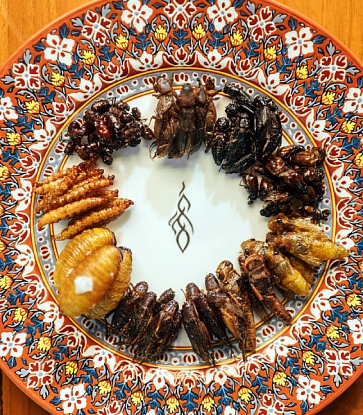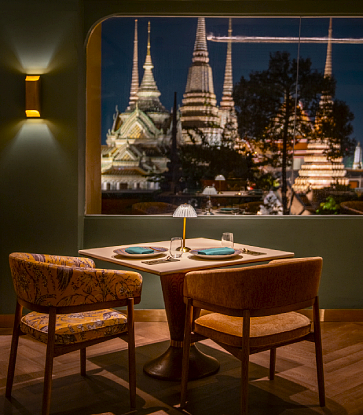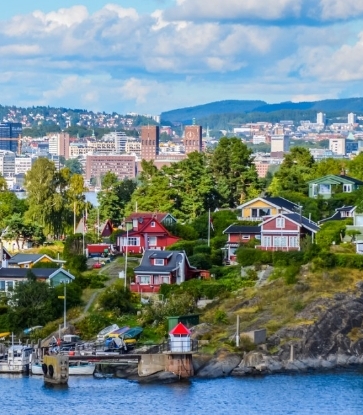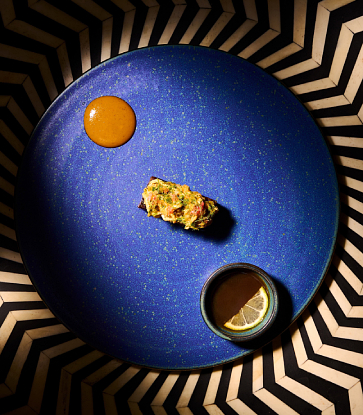Without a doubt, 2022 was an exigent reminder that sustainable gastronomy matters more than ever. Restrictions on imported produce during the pandemic means chefs had to look inward and around for locally-grown ingredients, reassessing their kitchen practices from production methods to waste management.
Prior to the pandemic, the MICHELIN Green Star debuted in the MICHELIN Guide France 2020 with the aim of recognising chefs and restaurateurs who are at the forefront of promoting sustainable practices in the kitchen. The brand new MICHELIN distinction is complementary to any Selected, Bib Gourmand, or Star restaurants. With a vision to echo their sustainable efforts, the MICHELIN Guide has rolled out the Green Star internationally in the subsequent Michelin Guide launches across Europe and Asia.
From Roganic’s in-house microgreens and zero-waste practice to PRU’s terroir-driven dining experience that celebrates produce from nearby sea and land, these Green Star restaurants in Asia are proof that gastronomic excellence does not need to come at the cost of our environment.

MICHELIN Guide Hong Kong Macau
Roganic
One MICHELIN Star and MICHELIN Green Star, MICHELIN Guide Hong Kong Macau 2022
A sister restaurant to the UK’s MICHELIN Green Star restaurant L'Enclume, Roganic is the brainchild of Simon Rogan, who has been at the forefront of promoting provenance and traceability of the ingredients over the past decade.
Committed to delivering a “farm-to-fork” dining experience, Roganic’s sustainable practices range from growing microgreens in-house and sourcing from local, organic farms to reduce carbon footprint; a zero-waste approach to use the entirety of each ingredient; and conscious packaging choices to avoid plastic use.
The chef's commitment: "The team makes every endeavour to use the entirety of each ingredient to achieve zero-waste. Techniques like dry-ageing and curing have been introduced. Our menu brings local poultry and veggies to the table, as well as house-grown herbs and micro greens using a technological system from Evogro. Plastic usage is reduced by using compostable alternatives such as plant-based packaging for takeaways. To further promote a sustainable dining concept, we host a series of talks and workshop for students and organisations to share our experience." —Ash Salmon

Amber
Two MICHELIN Stars, MICHELIN Guide Hong Kong Macau 2022
When chef Richard Ekkebu announced his bold new culinary philosophy–including a gluten- and dairy-free menu with vegetable-led dishes—in 2019, it revolutionised the way diners look at French fine dining.
Today, Amber is at the forefront of creating positive change through its comprehensive sustainability efforts, both externally and internally. From establishing a sourcing programme that ensures the use of sustainable, organic and local ingredients, raising awareness through Green Monday staff meals, to developing plant-based alternatives to replace plastic in the kitchen, the restaurant’s sustainability practices are documented in an 18-page sustainability statement, which is accessible via a QR code.
The chef's commitment: "Our menu is dairy-free and less meat-centric, uses local organic produce, as well as sustainably harvested seafood, and Fair Trade agricultural commodities. We work with manufacturers to develop plant-based alternatives for plastic products. An anaerobic digester system has been introduced to process food waste, while other materials are recycled."—Richard Ekkebus
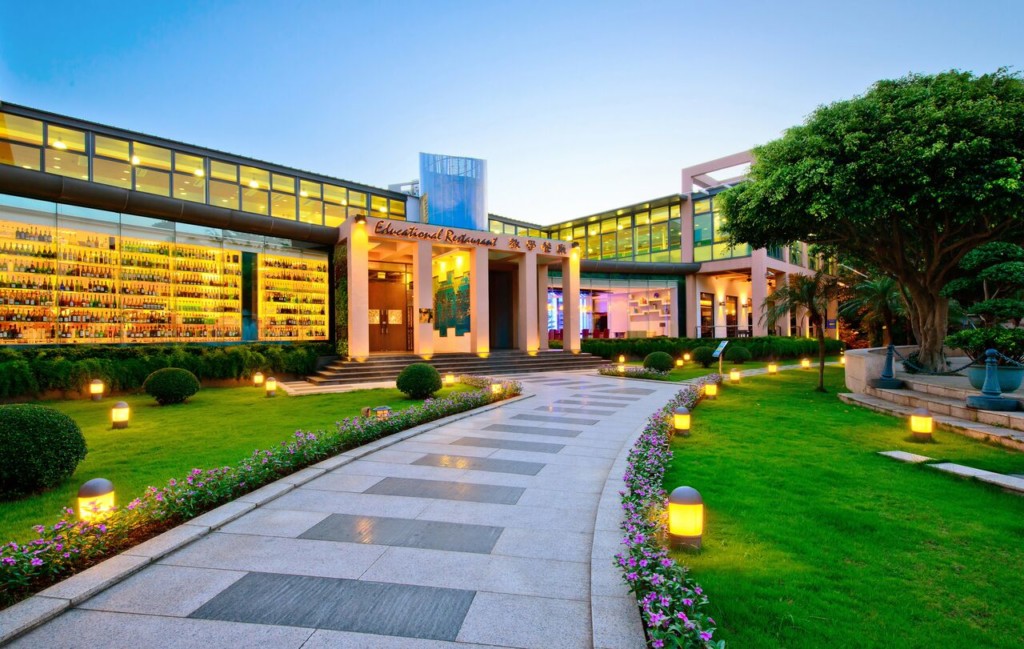
IFT Educational Restaurant
Bib Gourmand and MICHELIN Green Star, MICHELIN Guide Hong Kong Macau 2022
Serving a mix of European and Macanese cuisine, IFT Educational Restaurant serves as a training unit for students studying hospitality. An advocate of organic agriculture, the institute nurtures the practice of homegrown herbs, salad leaves and vegetables.
To sustain an organic ecosystem, students are encouraged to practice crop rotation and biological pest control to ensure the ingredients are served in the best condition.
The chef’s commitment: "The restaurant was set up as an educational training unit to sustain the development of Macau’s hospitality industry. In the kitchen, we try to minimise food scraps both in teaching and cooking. Food waste is converted into fertiliser by a food decomposer, and then used to grow herbs and greens in our garden, which employs crop rotation and biological pest control. We are committed to reducing energy and resource consumption by using a diverse approach involving a solar energy system, paperless policy, and infra-red sensors for electrical appliances."

MICHELIN Guide Thailand
PRU
One MICHELIN Star and MICHELIN Green Star, MICHELIN Guide Thailand 2022
Back in 2019, PRU was the only restaurant in the two regions of Phuket and Phang-Nga to have been awarded a MICHELIN star in the MICHELIN Guide Thailand that year. In the 2021 edition, PRU made history again as the first restaurant in Thailand to receive a MICHELIN Green Star. And the story repeats itself as the establishment remains the only restaurant in Thailand in 2022 edition to receive the award since its debut in 2021.
Focusing on respectfully sourced local produce since day one, PRU—short for “Plant, Raise, Understand”— is led by Dutch chef Jimmy Ophorst. Just a 20-minute drive away is the restaurant’s own 96-hectare organic farm, home to its organic vegetable gardens, free-range chickens, and ducks.
The chef's commitment: “We strive to minimise our carbon footprint, chemical use, and food waste to promote a ‘Dine Good, Do Good’ philosophy. Only seasonal ingredients from Thailand are used, including line-caught seafood and free-range animals. Our research team built a seed bank to preserve local agricultural biodiversity.” — Jimmy Ophorst
READ MORE: Thailand’s First MICHELIN Green Star Award Winner Pru: We Aren’t There Yet, But We’re On The Way

MICHELIN Guide Beijing
King’s Joy
Three MICHELIN Stars and MICHELIN Green Star, MICHELIN Guide Beijing 2022
Just a two-minute walk from Yonghe Temple, King’s Joy is often credited as the golden standard for fine vegetarian cuisine. Under the helm of Taiwanese chef Gary Yin, the ingredients are sourced from local, organic farms, and the kitchen is committed to reducing energy and food waste.
At the forefront of sustainable gastronomy in China, King’s Joy offers refined plant-based options that have become restaurant’s signature, including honeylocust, fox nuts and peas, as well as rice with assorted mushrooms and peach resin.
The chef's commitment: "King’s Joy offers vegetarian cuisine using green and seasonal produce that is sourced from local, organic farms. We strive to reduce energy and resource consumption by banning disposable items, reducing electricity usage and recycling. We also promote a sustainable lifestyle through community activities, including clothing donation and enzyme cleaner classes." — Gary Yin
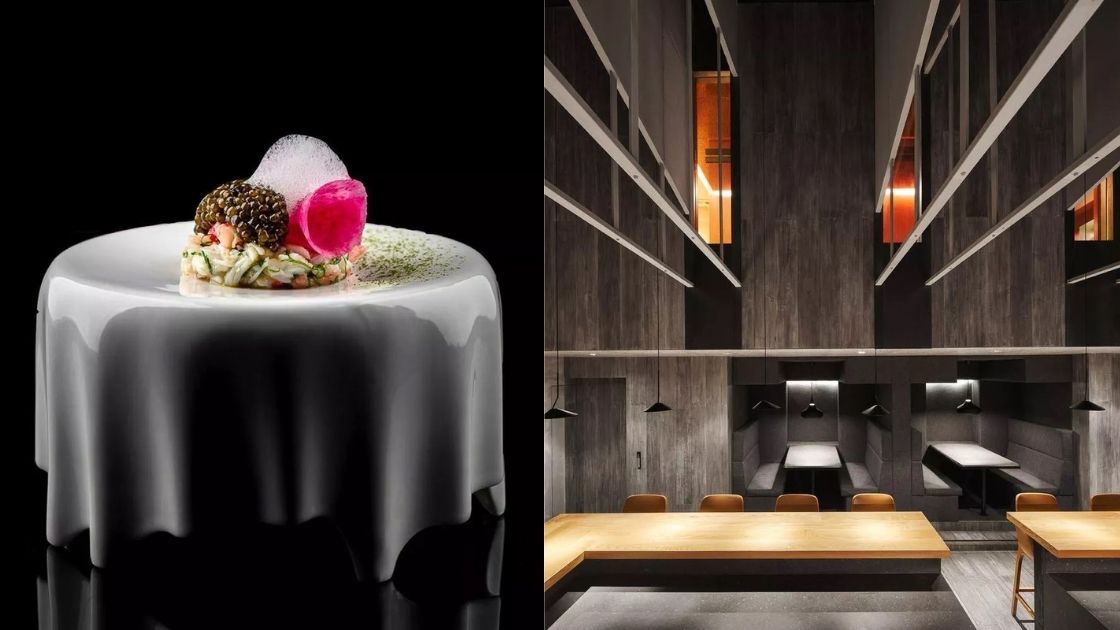
MICHELIN Guide Shanghai
Taian Table
Three MICHELIN Stars and MICHELIN Green Star, MICHELIN Guide Shanghai 2022
A fixture on the city’s dining scene since 2016, this brainchild of Chef Stefan Stiller is familiar to all local foodies. With counter seats enclosing an island where the chefs cook, guests gets to witness the birth of each course up close. The 10- or 12-course menu features eight dishes that change entirely every six to eight weeks. Diners then choose the rest from the classics or specials menu. The food is well-executed, sophisticated and original.
The chef's commitment: "We source from sustainable producers and minimise plastic use, food waste and energy consumption. We also recycle whenever possible and urge vendors to reduce packaging."—Stefan Stiller
MICHELIN Guide Seoul
A Flower Blossom on the Rice
Bib Gourmand and MICHELIN Green Star, MICHELIN Guide Seoul 2022
Located in a quiet alley away from the touristy bustle of Insa-dong, A Flower Blossom on the Rice is a restaurant that caters to the health-conscious diner, serving wholesome home-cooked fare using only certified organic ingredients sourced straight from the farm. The signature dish at this restaurant is the Bojagi Bibimbap — a log of cooked rice topped with five different sautéed vegetables in their multi-colored glory, encased in a crépe-thin egg omelet resembling a gift, tied with a seaweed ribbon and presented with a single flower on top.
The chef's commitment: "The restaurant procures 95% of its ingredients via direct transactions with farms that have been awarded organic, eco-friendly, animal welfare, non-pesticide, organic processing, and biodynamic certifications. Moreover, through its own agricultural entity, the restaurant is striving to popularise eco-friendly ingredients of the region." —Kim Min-joo
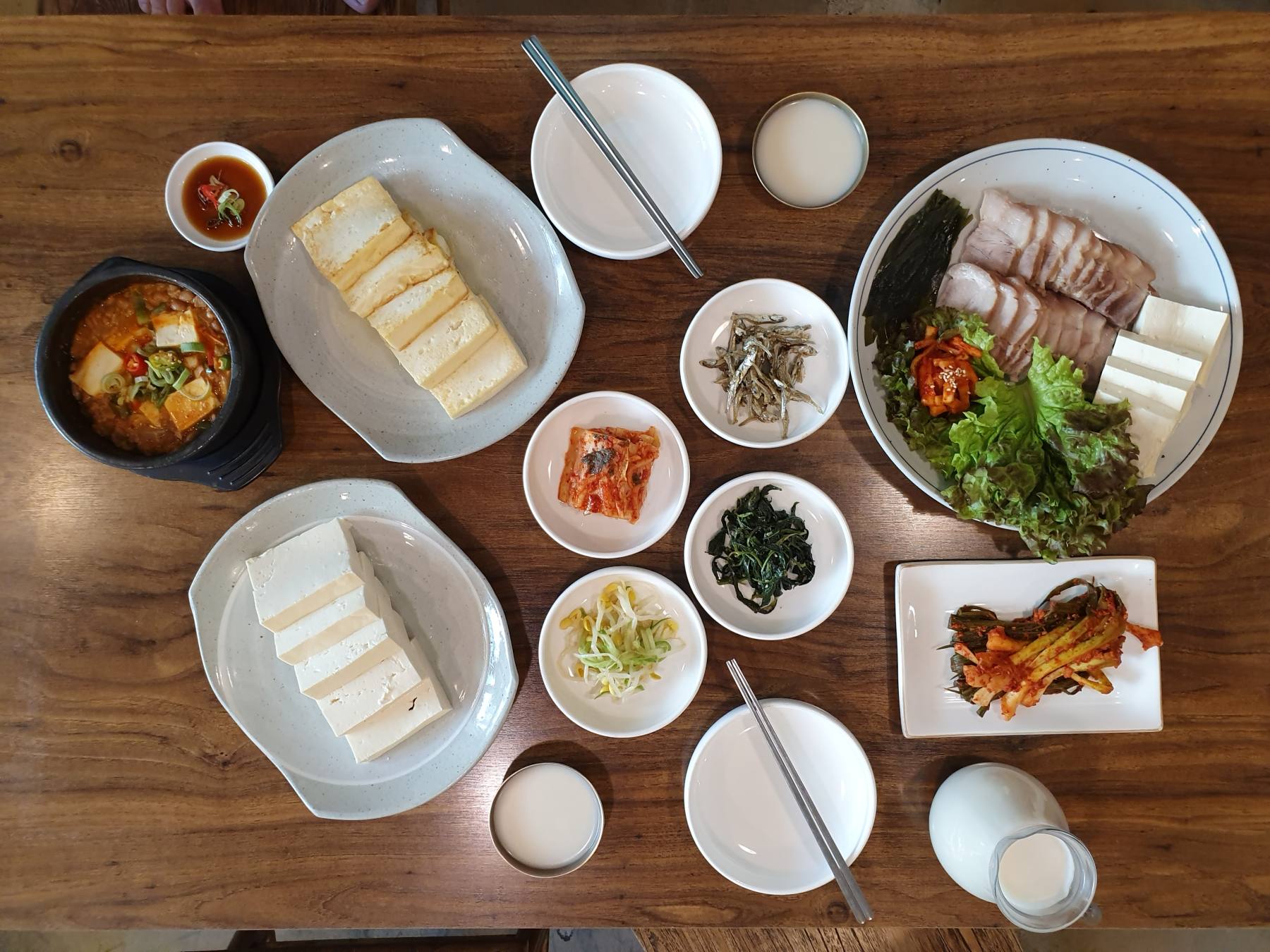
Hwanggeum Kongbat
Bib Gourmand and MICHELIN Green Star, MICHELIN Guide Seoul 2022
Tucked away in Ahyeon-dong, this hidden gem specializes in rustic homemade bean curd. The unctuously creamy bean curd is made from scratch, daily, at the crack of dawn. The secret to the elevated nuttiness of local soybeans that shine through in Hwanggeum Kongbat’s bean curd is the extra thick soymilk and reduced levels of the coagulant. With a desire to share healthy food with other people, the proprietor also makes and sells homemade rich soybean paste stew and unrefined rice wine.
The chef's commitment: "My kitchen team and I use a diverse range of fresh local ingredients- from Sobaeksan or Jeju Island-, most of them procured through direct transactions with producers and all delivered directly to the restaurant. To serve dishes imbued with the ultimate in freshness, tofu and kimchi are prepared daily. The leftover pureed soybean from making tofu is meticulously collected and sent to farms to be used as fodder." — Yoon Tae-hyeon
RELATED: MICHELIN Green Star Restaurants: Food for a better tomorrow

MICHELIN Guide Tokyo
NARISAWA
Two MICHELIN Stars and MICHELIN Green Star, MICHELIN Guide Tokyo 2022
The theme here is a ‘fusion of gastronomy and sustainability’. Chef Yoshihiro Narisawa first faced up to environmental issues when he visited local farmers and fishing ports and heard from many producers about how the natural environment was degraded and changing dramatically.
In thinking about environmental pollution, he considered the importance of soil. In order to preserve the forest, he supports sustainable farming and visits depopulated mountain villages every year to plant trees and clean up. As a result, the staff have also started to think more about the environment.
The chef's commitment: “The theme here is ‘coexisting with forests’, and we express environmental sustainability and food safety in our dishes. We visit depopulated mountain villages every year to plant trees and clean up, because we believe it is the duty of a chef to not only prepare food, but to preserve the wilderness ecosystem.” ―Yoshihiro Narisawa

MICHELIN Guide Kyoto Osaka
Miyamaso
Two MICHELIN Stars and MICHELIN Green Star, MICHELIN Guide Kyoto Osaka 2022
This restaurant-inn was founded in 1895 as a temple guesthouse. Fourth-generation chef, Hisato Nakahigashi goes to hills and fields nearby to pick herbs, wild vegetables and flowers to use in his dishes.
His efforts to ensure sustainability help protect the natural environment. The mountain environment has changed due to the impact of global warming, and vegetation has declined as boar and deer populations have increased. He uses wild game in his dishes to protect the forest ecosystem and mountain vegetation. His pursuit of a sustainable food cycle is a way to contributes to the local area.
The chef's commitment: “We have been enhancing our awareness of the natural environment for many years. We seek to coexist with it, specifically the mountain ecosystem. We use mainly ingredients from nearby such as herbs, river fish and mushrooms, thus reducing our food mileage. Picking plants that grow in the wild gives us a true sense of the season.”―Mr. Hisato, Nakahigashi

Kashiwaya
Three MICHELIN Stars and MICHELIN Green Star, MICHELIN Guide Kyoto Osaka 2022
Kashiwaya is a traditional Japanese restaurant in the suburbs of Osaka. The owner-chef respects the spirit of the tea ceremony and treats his guests with his heartfelt cuisine.
He started to be aware of sustainability because of his concern over the depletion of fishery resources. He is committed to activities that protect marine ecosystems and the environment, along with like-minded chefs, and he has collaborated with the teaching staff of Kinki University and with producers. He also contributes to making the traditional vegetables of Osaka more widely available and used, which in turn helps maintain the future of the local food culture. He strengthens ties with producers and works with them to preserve and cultivate seeds.
The chef's commitment: “We have partnered with a marine research institute to work on improving the quality and added value of farm-raised fish. We prize our relationships with nearby producers so that we can help keep alive the tradition and culture of Naniwa vegetables.”―Hideaki Matsuo
RELATED: Find out more MICHELIN Green Star restaurants in Japan here

MICHELIN Guide Taipei & Taichung
Mountain and Sea House
One MICHELIN Star and MICHELIN Green Star, MICHELIN Guide Taipei & Taichung 2021
At its core, the cuisine philosophy of Mountain and Sea House revolves around the belief that the most delicious flavours are always cultivated in the ground from natural ingredients. To that end, the chef takes the utmost care to source the restaurant’s ingredients from farmers and suppliers that are environmentally friendly and cultivate their crops in the most natural ways. For vegetables, this may include producers that avoid the use of chemical pesticides, and instead relying on other animals and microorganisms in natural compost to keep pests away. For meat or dairy, this would include humanely raised cattle or free-range chickens that are reared with no added hormones or over-feeding to fast-track their growth.
They hope that with their efforts, they are able to present the beauty of Taiwan’s sustainable agriculture, seasonal produce and terroir and present it in an exquisite way through the artisanal, traditional Taiwanese cuisine at Mountain and Sea House.
The chef's commitment: "The farm-to-table concept is at the core of our ethos. Owned by an organic food company, we source seafood and livestock from small producers. We believe that local produce is the key to good cuisine."— Leo TSAI

Yangming Spring (Shilin)
MICHELIN Green Star, Michelin Guide Taipei & Taichung 2021
The founder of Yangming Spring (Shilin) Chen Chien-Hung believes that a vegetarian diet is the kindest way to treat the environment: "We often share with our guests that having a vegetarian meal is like allowing the planet a moment to catch its breath. ” he shares. Chen proceeded to take things a step further by removing eggs and dairy from the menu and making it vegan in 2020.
The eco-friendly features of Yangming Spring (Shilin) extend beyond the kitchen as well. Adjacent to the main dining room, the Ruoshui Tea Room overlooks a pond that is laid with bentonite instead of cement, preventing damage to the earth beneath it. Expansive floor-to-ceiling windows bring in natural sunlight into the restaurant and reduce the amount of electricity required to power the lights.In recent years, the restaurant has also been the beacon for sustainability through outreach efforts in cooking classes, retail outlets, e-commerce, as well as overseas exchanges.
The chef's commitment: "We consider vegan as not just a culinary practice but also a lifestyle that respects the environment. Yangming Spring became a vegan restaurant in 2020; it employs ‘Cherish Food’ practices and recycling to minimise waste. Our team also publishes books, organises talks, and runs a vegan retail shop to promote this belief."
Hero image: Courtesy of Roganic
Written by Aileen Li in Shanghai, Wakana Kubo in Japan, Kim Nayoung in Seoul, Pruepat “Maprang” Songtieng in Bangkok, Pearl Yan in Hong Kong, and Hsieh Ming-ling in Taipei; introduction and edits by Pearl Yan.






